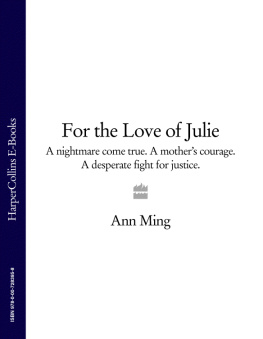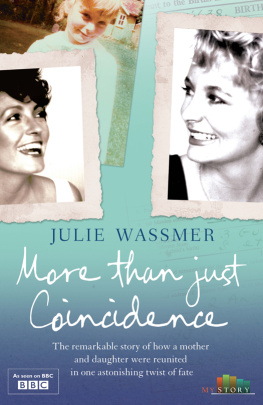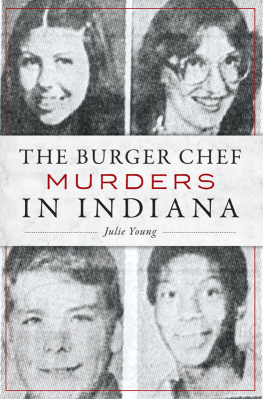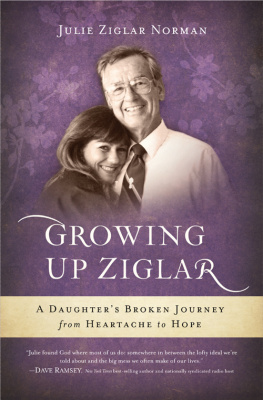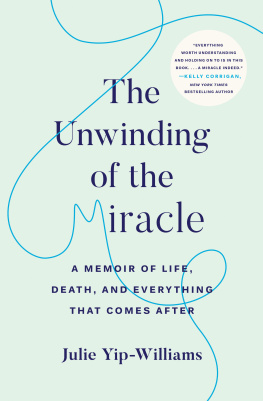In many ways the sad story of Julie Scully represents the dark side of the American dream. The all-American girl who grew up to be a beautiful model apparently had the world at her feet. But she threw it all away in a desperate search for love with a dangerously troubled Greek stranger whom she met while cruising the Caribbean with her husband.
I first read about Julies horrific murder in London, England, and decided to discover what had set her on her path to destruction. At first sight so many aspects of Julies savage killing did not make sense. I was intrigued by why had she abandoned everything to move to a desolate part of northern Greece, in pursuit of an unrealistic dream.
After enlisting the support of Julies ex-husband, Tim Nist, and that of her family, I immersed myself in Julies life for a year, trying to unravel the mystery that surrounds her death. Spending time in Kavala, Greece, Ivisited the places where her lover George Skiadopoulos had grown up and where Julie would die so violently at his hands.
I am deeply indebted to Julies friends and family, who all fully cooperated with this book. Most of all I would like to thank Tim Nist for his patience and candor during our many hours of conversation at his house. Few husbands have had to endure the trials he has and there were many emotional moments as he relived his seven-year marriage to Julie.
Much gratitude is also owed to Julies mother, Julia Scully, who has suffered horribly since her daughters murder. In our often tearful talks she remained objective as she willingly discussed her beloved daughter.
Thanks must also go to Julies father, John Scully Sr., and her brother, John Scully Jr., for the kindness in sharing details of Julies childhood and early life.
I also spent many hours talking to many of Julies friends, who were all hit hard by her untimely death. Her best friend Tracey Allen was a constant source of inspiration for me as I wrote the book and I am also indebted to Susan White and Cheryl Chuplis for their remembrance of Julie. In particular Tony Capella provided a clear, objective view of Julies final years and her decline.
I am also indebted to Athens AP Bureaus Brian and Tula Murphy, Patrick Quinn and my wonderful translator Theodora Tongas, who helped pave the way during my stay in Greece. I would also like to thank George Frimis of Antenna TV and the Dean of Greek Crime Reporters, Panos Somboulos, both of whom provided invaluable background on the case. I also spent an interesting two hours with George Skiadopouloss attorney, Sakis Kehagioglou, at his office in Athens.
In Kavala I was greatly helped by local journalist Vasilicki Liotaki who showed me the town, introducing me to Skiadopouloss friends, Demetrios Copsahelios and Alexis Makezedis.
In Philadelphia I was greatly helped by Vince Ziemba, Kenneth Freeman, and Judge Paul Panepinto of Philadelphia Family Court.
Thanks also goes to The Trentonian newspaper which kindly gave me access to its files. Especially helpful was Eric Ladley, city editor Paul Micole, and publisher Dave Bonfield. I am also indebted to Tom Kelly, Cyndi Manion, Sandy Schwartz and Liberty of the Greek Press Office in New York as well as the many others I interviewed who wished to remain anonymous.
But one of my biggest debts of gratitude must go to my editor at St. Martins Press, Charles Spicer, for his encouragement. Credit is also due to my literary agent lion, Peter Miller and his staff and PMA.
My thanks also to: Joseph Cleeman, Annette Witheridge, Danny Trachtenberg, Cari Pokrassa, Chris Bowen, Roger Hitts, Fred and Linda Wehner, Chris Wilson, Wensley Clarkson, Katie Lyons, Daphna Inbar, Scott Flander, Earl Wallace and Bobby Fisher.
In the months after Julies ashes were scattered around Dennisville Lake, friends and family still found no real sense of closure. And George Skiadopoulos, awaiting his trial in Kavala Prison, remained the only one who really knew what he did with Julies beautiful head.
Although he told police that he threw it into the Aegean Sea, many wonder if he didnt bury it somewhere, as his own macabre trophy of his eternal love. Now Tracey Allen and Susan White are planning to organize a search for Julies head.
Almost all the money that Julie took to Greece has now been recovered.
On a hot, sunny July afternoon Tim Nist sat in his front room on Mansfield Road, sorting out Julies personal possessions which had just arrived back from Greece. In the corner by the front door lay the unopened wedding dress she was to have worn when she married George Skiadopoulos. It disturbed Tim to have the dressin the house and he has asked Susan White to take it back to the shop. In the following months Tim made plans to attend the murder trial.
Now three-and-a-half years old, Katie Nist looks more like her mother than ever. She has many of Julies traits, continually vying with her father to get her own way. Susan White and her son Robbie are regular visitors to Mansfield Road and often baby-sit when Tim is away on business.
One night I was here watching the kids, said Sue, and Katie said to my son, My mommy ran away! My mommy ran away! And Robbie said to her, No, your mommy didnt run away. She loves you.
In the aftermath of her daughters murder, Julia Scully moved out of Tim Nists house and cut herself off from her family. She seldom sees her granddaughter Katie anymore and struggles through each day trying to come to grips with what has happened.
Julia says she no longer hates her daughters murderer, refusing to waste her energy on him anymore. She now prays every day and tries to see Julies death in the larger context of her Navajo culture.
I was taught that the Creator already knows how long you are going to live here, says Julia tearfully. Its all mapped out for you. Kids can die at an early age. I have to believe her death was already decided thousands of years ago before she was even born.
On Saturday, November 27, 1999, George Skiadopoulos finally went on trial, accused of killing Julie Scully and desecrating her body. Six weeks earlier a Kavala court had ruled that he could not plead insanity as a defense, ruling him legally sane when he butchered Julie. Already the high-profile murder case had been postponed for aweek after Skiadopouloss lawyer Sakis Kehagioglou, had asked for a delay, saying that he had a problem getting to Kavala. Now pleading guilty to Julies murder, the former sailor faced a maximum sentence of life imprisonment without parole.
Tim Nist was in the courthouse in the tiny town of Drama, ninety miles north east of Salonika, when armed police led Skiadopoulos to the defendants bench in chains. Now twenty-five, Skiadopoulos appeared to have been working out and had lost weight during his ten-month incarceration.
Once again Kehagioglou asked for a postponement, saying that he was still not ready to proceed, but this time presiding Judge Panayota Mandikou refused to delay the trial any longer.
During the four-day trial Tim Nist gave evidence to the three judges and four jurors through a translator, speculating that Skiadopoulos may have killed his ex-wife for her divorce settlement money. Up to that point Skiadopoulos had remained silent throughout the proceedings but now he suddenly rose from the bench.
I have received many attacks these days, he shouted, pounding his fists on the table in front of him. Much has been heard about financial motives but I will prove it all lies.



